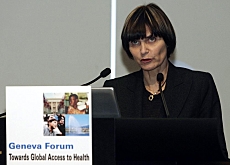Medical experts tackle global health gap

Health experts from around the world are exploring ways to improve access to treatment and care in poorer countries at a major three-day conference in Geneva.
Speaking at the event’s opening on Wednesday, Swiss Foreign Minister Micheline Calmy-Rey stressed the need for strengthening health systems in developing nations and pooling expertise.
“Today’s world is still marked by poverty, continued gender inequalities, growing inequities and plagued by infectious diseases such as tuberculosis, HIV, malaria or cholera, which could all belong to the past if access to knowledge, technologies and wealth could be more equally shared across this planet,” she said.
“The list of burning health problems the international community is confronted with is huge.”
The conference attended by around 1,000 participants from 80 countries has been organised by Geneva University’s faculty of medicine and Geneva University Hospital, which is celebrating its 150th anniversary.
According to organisers, the health of millions could be improved simply through better and more efficient access to existing services, drugs, vaccines and medical staff.
“If we look at today’s world, we see a large proportion of the world’s population still struggling with the very same challenges and problems we as a country faced some 150 years ago,” said the Swiss foreign minister.
“Is it acceptable that today in eastern Africa only one in three pregnant women can deliver their baby with the help of a skilled attendant, making pregnancy and childbirth the leading cause of death and disease in women of reproductive age in developing countries?”
Health intervention
Calmy-Rey added that the vast majority of these deaths would be preventable through low cost public health intervention.
She also highlighted the need to address the root causes driving “this epidemic”: poverty, gender inequality, lack of education and information, instability and conflict.
The theme of war and its effects on access to health care was taken up by Jakob Kellenberger, president of the Swiss-run International Committee of the Red Cross. He told the conference that the prevalence of HIV “skyrockets” in most conflict-torn countries.
“Of the more than 40 million people infected worldwide, three-quarters are in Africa. Africa is at the same time the continent with the highest number of armed conflicts. The link between conflict and the spread of diseases is undeniable,” he said.
Deep divide
Former United Nations Human Rights Commissioner Mary Robinson noted that a nation’s health system was its “life force” but that inequalities still ran deep and in some places were growing.
“The reality is that the right to health is still not universally recognised as a fundamental human right. Like other economic and social rights, it has been neglected and indeed violated on a massive scale in too many parts of the world,” she said.
She added that only through committed leadership and effective partnerships would real progress towards the goal of access to health be achieved, especially for the most marginalised and excluded.
Robinson, who is now president of Realising Rights: the Ethical Globalisation Initiative, said more also needed to be done to stem the flow of qualified medical personnel away from poorer countries.
swissinfo, Adam Beaumont in Geneva

More
International Committee of the Red Cross
The Swiss Agency for Development and Cooperation spent SFr86 million ($70 million) in 2004 on health-related international cooperation and humanitarian aid.
The SDC has identified five health priorities: strengthening good governance of health systems; developing pro-poor health services; empowerment of communities and users of health services; control of major communicable diseases; and improving sexual and reproductive health.
One example of its work over the past decade has been in supporting the use of insecticide-treated nets for malaria control in sub-Saharan Africa.
Less than 20% of HIV patients in Africa receive antiretroviral drugs.
Poor nutrition is a factor in more than half of all child deaths worldwide.
In Africa and Asia, 50% of poor people lack access to essential medicines.

In compliance with the JTI standards
More: SWI swissinfo.ch certified by the Journalism Trust Initiative

You can find an overview of ongoing debates with our journalists here. Please join us!
If you want to start a conversation about a topic raised in this article or want to report factual errors, email us at english@swissinfo.ch.